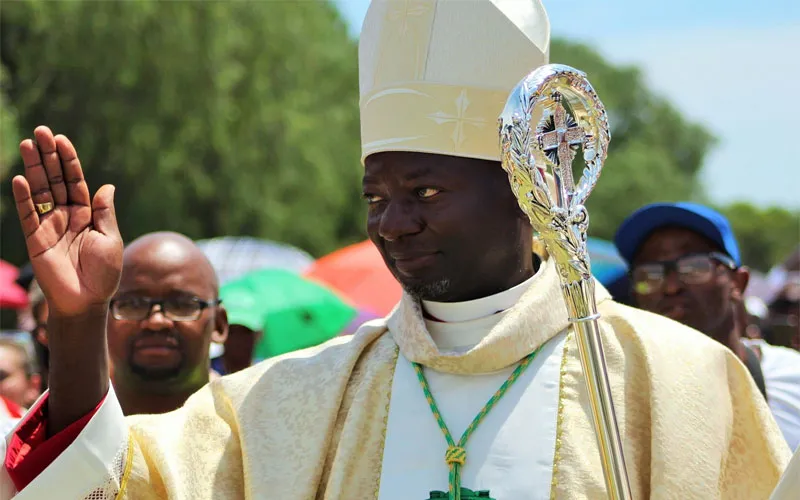In his homily, Bishop Sipuka brought to the awareness of the new Bishop of Aliwal North about the “syncretism or confused merging of traditions of worship from all the other ecclesial communities.”
“Catholics are not Lutherans, Anglicans are not Methodist, Presbyterians are not Zionist, and so on. Yet sometimes during worship in the Catholic Church you wonder if you are in the Catholic Church or in any of the other ecclesial communities that I have mentioned,” Bishop Sipuka said.
In the considered opinion of Bishop Sipuka, “Modifications of worship and doctrine between the Catholic Church and other ecclesial communities if they are to be meaningful must be based on well thought out engagements, as is the case with the doctrine of justification for example, between the Lutheran and Catholics and not on emotional and superficial grounds.”
Bishop Sipuka reached out to the new Bishop on “the balance between an intellectual and sentimental approach to worship” and explained, “Many people leave the Catholic Church because it is cold, individualistic, mechanistic, and intellectual and does not respond to the human and spiritual needs of its members.”
He added, “As a Catholic Church, we have a lot to learn from other ecclesial communities in terms of creating a sense of communion and belonging and in terms of making the faith respond to the concerns and existential needs of sickness and material poverty of our people. Yet on the other hand, it would be careless and irresponsible of us to let go of the strength of our liturgy and doctrine that put emphasis on the cross and sacrifice.”
(Story continues below)
Explaining how “the worship of wealth and money leads to doom because the more you get of it, the more you realize how poor you are,” Bishop Sipuka emphasized the need to foster the Catholic tradition that is rooted in the person of Jesus and his teaching.
“While we need to learn from other ecclesial communities that God wants us to be happy, to be successful and to be well,” the South African Prelate noted, “we need to share with them also from our Catholic tradition our appreciation of Jesus’ call to enter by the narrow gate, to take up our cross and follow Jesus daily as the coming Lenten period reminds us and that resurrection is preceded by the passion, that man does not live on bread alone and that happiness on this earth does not constitute the fullness of our happiness because our complete happiness lies in the future with God for which we must prepare ourselves.”
Bishop Sipuka also asked the new Bishop to pay attention to the “true nature” of worship as he takes up the role of shepherding the people of God in Aliwal North diocese.
“Often one hears a comment from people when they come from Church, “it was nice”, but the remaining question is “was it a worship?”, Bishop Sipuka questioned.
He explained and probed, “After worship, the question is, “have I worshiped God, am I transformed by the worship, am I more detached from my sins through worship, am I more eager in my missionary work because of worship or the consideration is that was nice? Does worship minimize or eliminate my sin of pride, envy, meanness, indifference, injustice and anything else that blinds me from the divine truth and mercy that Christ is calling us to have?”
“Again here, the temptation of uncritical imitation of other ecclesial ways of worshipping can make us lose of our own understanding of worship as Catholics,” Bishop Sipuka noted and recommended, “Your task as bishop Mgrs. Kizito is to give guidance about the Catholic understanding of worship, which includes dignity, silence, proper spiritual preparation, appropriate postures and gestures fitting signs and symbols, conversion and of course joyful songs as well.”
“I do not want to frighten you, but today’s first reading finishes by saying that because Jeroboam conducted himself in such a careless way about worship, this caused the ruin of his house and extinction from face of the earth,” Bishop Sipuka addressed himself to the new Bishop of Aliwal diocese.
“As you lead the people being entrusted to you today as their bishop, may worship in this diocese be genuine and lead to an encounter with true God and not an encounter with God in our own image,” the South African Prelate, a member of SECAM Standing Committee, concluded.
Fr. Don Bosco Onyalla is ACI Africa’s founding Editor-in-Chief. He was formed in the Congregation of the Holy Ghost Fathers (Spiritans), and later incardinated in Rumbek Diocese, South Sudan. He has a PhD in Media Studies from Daystar University in Kenya, and a Master’s degree in Organizational Communication from Marist College, New York, USA.








